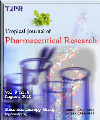
|
Tropical Journal of Pharmaceutical Research
Pharmacotherapy Group, Faculty of Pharmacy, University of Benin, Benin City, Nigeria
ISSN: 1596-5996
EISSN: 1596-5996
Vol. 14, No. 7, 2015, pp. 1191-1197
|
 Bioline Code: pr15156
Bioline Code: pr15156
Full paper language: English
Document type: Research Article
Document available free of charge
|
|
|
Tropical Journal of Pharmaceutical Research, Vol. 14, No. 7, 2015, pp. 1191-1197
| en |
Neuroprotective Effect of Insulin-like Growth Factor-II on 1- Methyl-4-Phenyl Pyridinium-Induced Oxidative Damage in Cortical Neuronal Cells
Dong, Wei; Hu, Lin & Xu, Xiao-Wei
Abstract
Purpose: To evaluate the receptor-mediated neuroprotective effect of insulin-like growth factor-II (IGFII)
on 1-methyl-4-phenyl pyridinium (MPP)-induced oxidative damage in adult cortical neuronal cultures.
Methods: Adult rats were randomly divided into 5 groups. Cortical neurons were prepared from rats.
The cells were exposed to 10 μM of MPP (group 1, G1); MPP + 100 ng/mL of IGF-II (group 2, G2);
MPP + IGF in the presence of 20 ng/μL IGF-I analogue (group 3; G3); 5 ng/μL anti-IGF-IIR (group 4;
G4); or MPP + IGF II + IGF inhibitor (group 5; G5). The level of reactive oxygen species (ROS), levels of
oxidative stress markers, antioxidant enzymes, mitochondrial functional markers were analyzed in the
MPP-treated neuronal cells (with or without treatment with IGF-II).
Results: The results demonstrate that IGF-II treatment protects MPP-induced toxicity by decreasing
ROS production (58.33 %; p < 0.001), AChE levels (50 %), and maintaining the innate antioxidants to
near normal levels. The study on oxidative functional markers showed that IGF-II significantly
decreased the MPP-induced elevated levels and mitochondrial markers (TBARS, 40 %, LOOH-39.28
%) to near normal levels. Further analysis using inhibitors of IGF-IR (IGF-I analogue) and IGF-IIR (anti-
IGF-IIR) showed that involvement of IGF-IIR might have greatly contributed to the neuroprotective effect
of IGF-II.
Conclusion: IGF-II receptors play a significant role in the neuroprotective mechanism of IGF-II by
acting as an antioxidant, thereby reducing the neuro-degeneration induced by oxidative insults. This
indicates that IGF-II receptors are a potential target for the treatment of diseases related to imbalance in
redox homeostasis.
Keywords
Insulin-like growth factor-II; Neuronal cells; 1-Methyl-4-phenyl pyridinium; Mitochondrial markers; Oxidative stress; Neuroprotection; Antioxidant
|
| |
© Copyright 2015 - Tropical Journal of Pharmaceutical Research
Alternative site location: http://www.tjpr.org
|
|
